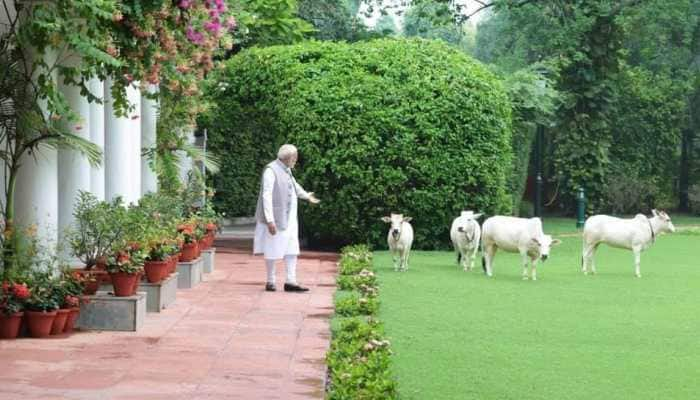Everything you need to know about Citizenship (Amendment) Bill, 2019
The Citizenship (Amendment) Bill, 2019 passed in Lok Sabha on December 9, 2019 seeks to make illegal migrants who are Hindus, Sikhs, Buddhists, Jains, Parsis and Christians from Afghanistan, Bangladesh and Pakistan, eligible for citizenship.
Trending Photos
)
Citizenship Amendment Bill, 2019, passed the Lok Sabha test on Monday (December 9) after intense debate and arguments from the government and the opposition on the Bill for over six hours. The Bill was passed after midnight with 311 MPs voting in its favour and 80 against. Union Home Minister Amit Shah gave a detailed explanation after the bill was tabled for discussion and said that it is a part of the Bharatiya Janata Party-led National Democratic Alliance manifesto.
At present, the Citizenship Act, 1955 regulates who may acquire Indian citizenship and on what grounds. A person may become an Indian citizen if they are born in India or have Indian parentage or have resided in the country for a period of time, etc. But illegal migrants are not eligible to become Indian citizens. An illegal migrant is a foreigner who: (i) enters the country without valid travel documents, like a passport and visa, or (ii) enters with valid documents, but stays beyond the permitted time period, reported PRS India.
Illegal migrants may be imprisoned or deported under the Foreigners Act, 1946 and the Passport (Entry into India) Act, 1920. Under the 1946 and the 1920 Acts, the Centre has the power to regulate the entry, exit and residence of foreigners within India. In 2015 and 2016, two notifications were issued by central government exempting certain groups of illegal migrants from provisions of the 1946 and the 1920 Acts. These groups are Hindus, Sikhs, Buddhists, Jains, Parsis and Christians from Afghanistan, Bangladesh and Pakistan, who arrived in India on or before December 31, 2014. According to PRS India, the notifications meant that illegal migrants belonging to these communities will not be deported or imprisoned for being in India without valid documents.
In 2016, the BJP-led government at the Centre had introduced a Bill to amend the Citizenship Act, 1955. The Bill aimed at making illegal migrants belonging to these six religions and three countries eligible for citizenship and made some changes in the provisions on registration of Overseas Citizens of India (OCI) cardholders. The Bill was sent to a Joint Parliamentary Committee, which submitted its report on January 7, 2019 and was passed by Lok Sabha on January 8, 2019. The central government, however, did not table the Bill in Rajya Sabha and it lapsed with the dissolution of the 16th Lok Sabha.
The Citizenship (Amendment) Bill, 2019 passed in Lok Sabha on December 9, 2019 seeks to make illegal migrants who are Hindus, Sikhs, Buddhists, Jains, Parsis and Christians from Afghanistan, Bangladesh and Pakistan, eligible for citizenship. The Bill, however, exempts certain areas in the North-East from this provision. The Bill also makes amendments to provisions related to OCI cardholders. According to PRS India, a foreigner may register as an OCI under the 1955 Act if they are of Indian origin (e.g., former citizen of India or their descendants) or the spouse of a person of Indian origin. The foreigner will then be allowed to enjoy benefits such as the right to travel to India, and to work and study in the country. The Bill amends the Act to allow cancellation of OCI registration if the person has violated any law notified by the central government.
Here are the salient features of Citizenship (Amendment) Bill 2019
- Eligibility for citizenship for certain illegal migrants: The Act prohibits illegal migrants from acquiring Indian citizenship. Illegal migrants are foreigners who enter India without a valid passport or travel document, or stay beyond the permitted time.
- The Bill amended the Act to provide that Hindus, Sikhs, Buddhists, Jains, Parsis and Christians from Afghanistan, Bangladesh and Pakistan will not be treated as illegal migrants. In order to get this benefit, they must have also been exempted from the Foreigners Act, 1946 and the Passport (Entry into India) Act, 1920 by the central government. The 1920 Act mandates foreigners to carry passport, while the1946 Act regulates the entry and departure of foreigners in India.
- Consequences of acquiring citizenship: The Bill says that on acquiring citizenship: (i) such persons shall be deemed to be citizens of India from the date of their entry into India, and (ii) all legal proceedings against them in respect of their illegal migration or citizenship will be closed.
- Exception: Further, the Bill adds that the provisions on citizenship for illegal migrants will not apply to the tribal areas of Assam, Meghalaya, Mizoram, or Tripura, as included in the Sixth Schedule to the Constitution. These tribal areas include Karbi Anglong (in Assam), Garo Hills (in Meghalaya), Chakma District (in Mizoram), and Tripura Tribal Areas District. It will also not apply to the areas under the Inner Line” under the Bengal Eastern Frontier Regulation, 1873. The Inner Line Permit regulates visit of Indians to Arunachal Pradesh, Mizoram, and Nagaland.
- The Bill further reduces the period of naturalisation for such group of persons from six years to five years.
- Grounds for cancelling OCI registration: The Act provides that the central government may cancel registration of OCIs on five grounds including registration through fraud, showing disaffection to the Constitution, engaging with the enemy during war, necessity in the interest of sovereignty of India, security of state or public interest, or if within five years of registration the OCI has been sentenced to imprisonment for two years or more. The Bill added one more ground for cancelling registration, that is, if the OCI has violated any law that is in force in the country.
Sources: The Citizenship (Amendment) Bill, 2016, as passed by Lok Sabha; The Citizenship (Amendment) Bill, 2019; PRS.
Issues to consider
Whether differentiating on grounds of religion is a violation of Article 14 of Indian Constitution
The Citizenship Amendment Bill provides that illegal migrants who fulfil four conditions will not be treated as illegal migrants under the Act.
The conditions are (a) they are Hindus, Sikhs, Buddhists, Jains, Parsis or Christians; (b) they are from Afghanistan, Bangladesh or Pakistan; (c) they entered India on or before December 31, 2014; (d) they are not in certain tribal areas of Assam, Meghalaya, Mizoram, or Tripura included in the Sixth Schedule to the Constitution, or areas under the “Inner Line” permit, i.e., Arunachal Pradesh, Mizoram, and Nagaland.
Notably, Article 14 of Constitution guarantees equality to all persons, including citizens and foreigners. It only permits laws to differentiate between groups of people if the rationale for doing so serves a reasonable purpose.
The question is whether this provision in Citizenship Amendment Bill, 2019 violates the right to equality under Article 14 of the Constitution as it provides differential treatment to illegal migrants on the basis of (a) their country of origin, (b) religion, (c) date of entry into India, and (d) place of residence in India.
The Bill differentiates migrants based on their country of origin to include only Afghanistan, Pakistan and Bangladesh. The Statement of Objects and Reasons in the Bill (SoR) states that people from Afghanistan, Pakistan and Bangladesh have migrated to India for a very long time, and these countries have a state religion, which has resulted in religious persecution of minority groups. While the SoR of the Bill says that millions of citizens of undivided India were living in Pakistan and Bangladesh, it has not explained the reason behind including migrants from Afghanistan.
It is also unclear why migrants from other neighbouring countries such as Sri Lanka (Buddhist state religion) and Myanmar (primacy to Buddhism) are not included in the list. It is to be noted that Tamils has had a history of facing persecution in Sri Lanka. In Myanmar, there is a history of persecution of a religious minority, the Rohingya Muslims.
Several Tamils from Sri Lanka and Rohingya Muslims have escaped from persecution in their respective countries in order to seek refuge in India. Since the Bill aims at providing citizenship to migrants escaping religious persecution in their own countries, it is not clear why illegal migrants belonging to religious minorities from these countries have been excluded from the Bill.
Second, the Bills only includes certain minorities in Pakistan, Afghanistan and Bangladesh, but it is a known fact that there are other religious minorities in these countries, who face religious persecution and seek refuge in India.
For example, Ahmadiyya Muslims have been facing constant persecution in Pakistan and atheists are also facing serious troubles in Bangladesh. It is unclear why these people were not included in the Bill.
The Bill also fails to explain why there is a differential treatment of migrants based on their date of entry into India, i.e., whether they entered India before or after December 31, 2014.
The Bill also excludes illegal migrants living in areas covered by the Sixth Schedule, that is, notified tribal areas in Assam, Meghalaya, Mizoram and Tripura. The Bill also excludes the Inner Line Permit areas. Inner Line regulates the entry of persons, including Indian citizens, into Arunachal Pradesh, Mizoram and Nagaland. Notably, when an illegal migrant residing in these areas becomes Indian citizen, he/she would be subject to the same restrictions in these areas, as are applicable to other Indian citizens.
Live Tv







)
)
)
)
)
)
)
)
)
)
